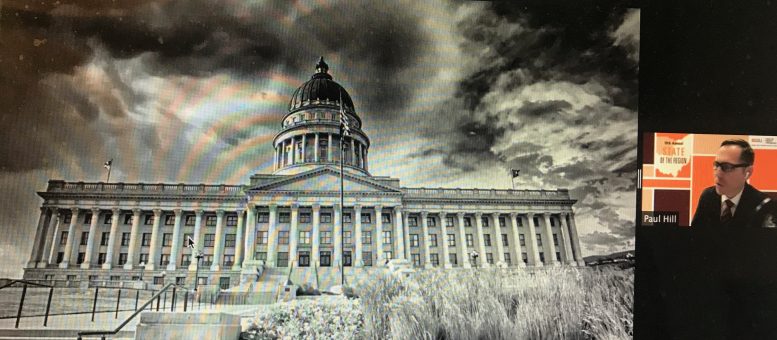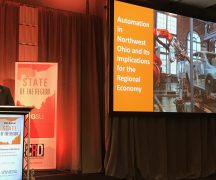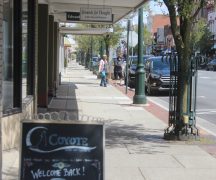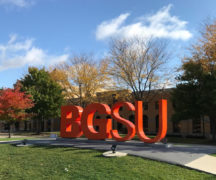By DAVID DUPONT
BG Independent News
A woman living in rural Utah works for NASA and controls a satellite orbiting Jupiter.
Now that’s remote work.
At Tuesday’s State of the Region conference, Paul Hill, an extension professor at Utah State University, discussed Utah’s initiative to promote work in his state. The first legislation was passed, overwhelmingly he noted except for one libertarian, in 2018. And the trend for remote work accelerated during the pandemic.
Before late winter 2020, companies had to be convinced of the value of remote work, Hill said. The pandemic made the case for him.
While Utah, Hill says, has gotten high marks for its business growth that had been concentrated in urban areas. Now Salt Lake City is getting more congested. The state, like so many others, experienced an urban-rural split where the urban areas thrived, while poverty flourished in rural areas.
Yet many people, he said, still wanted to stay in those rural communities.
The state came in with some advantages. While many young people were migrating to cities, the rural Utah population continued to grow. “We’re good at making babies,” Hill said.
Also, much of the state had a good broadband coverage, though he conceded the vast tribal areas are far behind. That was felt when schools were shut because of the pandemic.
By the end of this year, 25-30 percent of jobs nationwide will be done from home multiple days a week, according to Global Workplace Analytics.
Utah took a three pronged approach:
- Creating incentives for companies to hire remote workers in rural counties.
- Creating co-working spaces with high speed internet connections in rural counties.
- Developing a specialized remote training program.
To date, the state knows of 174 jobs created through the initiative. Those are just the ones for which people have filled out the state survey.
That’s not a lot, and pales in comparison to the Tyson plant that brought in 6,400 jobs. But Hill noted the multiplier effect of a dollar earned in a rural area generating more economic activity is greater than the multiplier effect in cities.
The conference itself was presented remotely over Zoom.
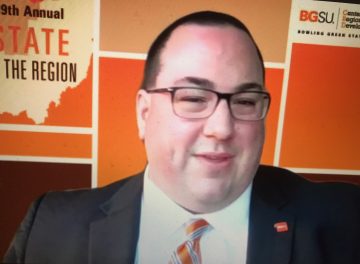
Russell Mills, the senior director of the Center for Regional Development at BGSU, said that Delaware County tops Northwest Ohio in the percentage of remote workers. The Columbus-area has 8.1 percent of its workers, or 8,142, in remote positions. In Wood County, 2.9 percent of workers, or 1,943, are in remote jobs The Center, which hosts the conference, also looked at the potential for remote jobs in the 27 counties in Northwest Ohio economic region as determined by JobsOhio.
The study estimated 13,318, or about 15.6 percent, of jobs in Wood County could be done remotely.
The region’s population, dropped almost 1 percent, or 10,300 people since 2016. Wood County was one of only nine counties in the region to gain population, 1.1 percent.
The pandemic hit the region hard, but most sectors, especially manufacturing and transportation have rebounded. The housing sector is booming.
Still restaurants and leisure and personal care sectors continue to see severe drops in employment, Mills reported.
The effects of the pandemic, and the benefits of the recovery, have been uneven, with lower wage workers hit harder and recovering more slowly.
Still household incomes did benefit, Mills said, from the federal government’s $27 trillion stimulus package
Mills and Rick Kaglic of the Federal Reserve Bank of Cleveland noted that rebounds in the unemployment rate may be deceptive.
Fewer people are in the work force, Mills said. Some left because of the virus, other were able to stay away because of unemployment and stimulus payments, and some people had to leave the workforce to take care of school age children taking remote classes.
In his introduction, State Rep. Jon Cross (R-Kenton) said it was time to open up Ohio for business. “The private sector understands how to keep this economy growing.”
He said the governor, health officials and medical community deserve applause for their work through the pandemic.
While saying physical health matters, Cross continued: “I will argue our mental health and social health matters. And, most importantly, our financial health matters. And I have consistently said that we can certainly save lives and save jobs. And that starts by being open for business.”

